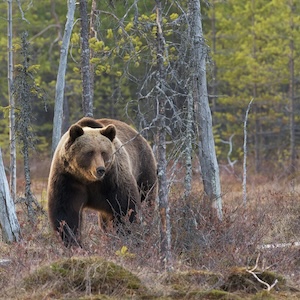
Exploring Community-led Mitigation Strategies to Prevent Carnivore-Herder Conflict in the Western US and Humla, Nepal
2025 CRP Student Researcher
Research Location:
Humla, Nepal and the Western USA
Conservation Partner:
Ukali
Faculty Mentors
Dr. Sapana Lohani and Erica Garroutte
2025 Student Researchers
Ava Fischer '26, Major: Biology; Minor: Anthropology
Srija Upadhyay '27, Majors: Biology and French/Francophone Studies
Project Description
Human-bear conflict poses significant challenges to both the environment and the livelihoods of pastoralist communities worldwide. In Humla, a remote region in northwest Nepal, the coexistence of herding practices and carnivores is increasingly threatened by climate change, degradation of high-elevation rangelands and pasture resources, and evolving herder livelihoods.
The Himalayan black bear, a key ecological species, is listed as vulnerable on the IUCN Red List due to widespread human-bear conflict across the Himalayas. Local herder communities have identified the black bear as one of the most problematic species, responsible for livestock and, occasionally, human fatalities. These conflicts are exacerbated by climate change, ecological shifts, agricultural changes, deforestation, and bear habitat disruption. There is an urgent need to understand the drivers of these conflicts and to identify effective mitigation strategies that can ensure both the persistence of bear populations and the sustainability of herder livelihoods.
Human-bear conflicts are also prevalent in the Western United States, where a variety of mitigation strategies have been implemented. These strategies offer valuable lessons that could inform conflict management efforts in Humla. As part of a long-term, community-led research and conservation initiative spearheaded by Ukali, a team of students from W&M and Nepal will explore human-bear conflict mitigation strategies used in the Western U.S. to assist the communities of Humla in identifying approaches they would like to adopt. The team will engage with ranching communities, federal and state agencies, and conservation NGOs in Colorado and Montana to learn about best practices for mitigating human-bear conflict. Additionally, they will conduct community surveys in Humla to assess local priorities and mitigation goals. Specifically, the students will:
- Obtain prior informed consent from local communities in coordination with local government and gather information on current conflict prevention strategies used in Humla.
- Explore conflict mitigation measures from other regions (e.g., Montana, Colorado) and document lessons learned and best practices that could be relevant for Humla's communities.
- Utilize field and satellite data to study bear population dynamics, habitat use, and identify potential conflict hotspots.
Project ID - Format
25-011-25 - CRP Year















